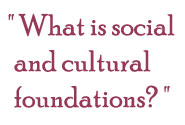 |
 |
WELCOME TO SOCIAL & CULTURAL FOUNDATIONS |
||
|
Here at the University of Washington, the field of social and cultural foundations is foundational in the sense that it addresses fundamental questions about the meaning, purpose and significance of education in culture and society. It is discipline-based. It explores education from the perspective of the humanities and the liberal arts, using tools of analysis based in disciplines such as history and philosophy. The field of foundations understands education as more than schooling. It is inclined to see issues of pedagogy and policy as expressions of enduring human dilemmas rather than as problems to be solved once and for all. The field of foundations addresses questions of meaning and context. It attends to questions such as: "What does social justice mean?" "What are the practices by which cultures have been transferred across time and different social groups?" Faculty in social and cultural foundations at UW teach substantive courses in the disciplines of history and philosophy of education. Most of these courses also meet college-wide distribution or methods course requirements. Usually between 12-15 graduate students, working on masters and doctoral degrees, focusing their work in Social and Cultural Foundations. Arriving from an array of backgrounds (e.g., as former teachers, as students in other fields, as educational program directors, etc.), students in Foundations pursue a variety of research interests in the history and philosophy of education ranging from the cultural history of schooling during the Progressive Era as depicted in film to the philosophical nature of bullying in schools to the history of school reform politics in Seattle Public Schools to the positioning of education in contemporary theories of justice. |
|
UW homepage | College of Education | Educational Leadership and Policy Studies

